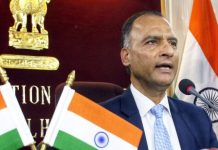 Recognising the ideals of colonial India and its heroes in independent India has become a romantic experience. We do not want to talk much about the socia-economic causes that were the core issues of freedom struggle. Very few Indians are aware that the entire freedom struggle movement was focused on the Dada Bhai Nauroji’s theory ‘Drain of Wealth’.
Recognising the ideals of colonial India and its heroes in independent India has become a romantic experience. We do not want to talk much about the socia-economic causes that were the core issues of freedom struggle. Very few Indians are aware that the entire freedom struggle movement was focused on the Dada Bhai Nauroji’s theory ‘Drain of Wealth’.
After this principle of Nauroji, Indians had discovered the real causes of poverty in colonial India. He said that the East India Company was sending money from India to Britain through its own policies. The British used to buy Indian goods and send it to the UK without having any British pound sterling. The rich Indians were also depositing their money in British banks. This process lasted long in the British period. The result was that India and Indians lacked wealth.
Due to the lack of wealth, India was unable to invest in agriculture, industry and trade, due to which the country got stuck in the poverty cycle.
After understanding this knowledge, almost all the famous historians and politicians made this idea the basis of criticism of British rule. After this, it was believed that money and capital must remain in the country.
In independent India, ‘Drain of wealth’ has emerged as a new form. Influenced by European authors, Indian writers also started addressing it with the term ‘black money’ by racial discrimination. Some thinkers prefer to call it undeclared assets. He also sees it as an undeclared property in the country. However, in politics it was mainly used for illegal money deposited in Switzerland and other European banks.
It was believed that if this illegal ‘Drained Money’ came to India, poverty here would end. Politicians calculated this by counting their fingers and told the people of the country through political forums. Prime Minister Narendra Modi also said that if this alleged black money comes to India then every Indian will get around 15-15 lakh rupees.
From these figures counted on fingers, the semi-educated new Indian middle-class was charmed. Politicians took advantage of this craze and made it national issue to win the 2014 general elections. Indian National Congress faced defeat and under the leadership of PM Narendra Modi, the Bharatiya Janata Party government promised to bring black money back to the India.
Modi government took several steps to curb black money, in which the demonetisation and tax information exchange agreement are the most prominent. As a result of the demonetisation, many Indians, especially small-time traders lost businesses and some even lost livelihood.
In the fight against black money, the aware media is also supporting the government. In the second year of Modi’s tenure, in February 2015, a noted newspaper released a list of 1195 Indians whose account and money are in the Geneva branch of HSBC. In the year 2016, the newspaper published the names of 500 more Indians in the Panama Paper Leak case, quoted by the International Consortium of Investigative Journalism, which had an illegal account abroad.
But these efforts did not stop the ‘Drain of Wealth’ and neither the alleged black money deposited in foreign countries. Famous Indian businessman Vijay Mallya escaped to Britain with a loan of about 9,000 crore in 2016. Nirav Modi, Lalit Modi, Vijay Mallya and Mehul Choksi are among 36 businesspersons who have absconded abroad after being named in scams or massive loan defaults, the government of Prime Minister Narendra Modi told the Parliament.
MJ Akbar, Minister of State, Ministry of External Affairs, said the government has sent extradition requests to concerned foreign countries. They handed a list to the Parliament.
In June 2018, the Swiss National Bank released annual data, according to which Indians deposited 50 per cent more in the year 2017 than last year and this amount has become around 7000 crore. The bank also said that in the last three years there were fewer tendencies to deposit money.
The Swiss National Bank report did not surprise the Indians. India seems to ignore the promises which the great politicians had made to them from the political forums. People of this country have forgotten that the poverty of India was the result of the ‘Drain of Wealth’ and that the country was trapped in the poverty cycle and is still trying to get out.
India’s neighbours appear to be more vigilant than India in the fight against Black Money. A Pakistani court sentenced former Prime Minister Nawaz Sharif to 10-year and seven-year sentence to his daughter Mariyam in the Panama Paper leak case in July, 2018, but India has not yet convicted any defaulter in the loan defaulting or black money cases. With the lack of wealth, we cannot hope to flourish business in the country. We need to learn from the history of India. There should be a stringent punishment and laws to check on the black money or illegal ‘Drain of Wealth’.
(Shekhar Suman Sinha, Research Scholar, Banaras Hindu University)
letters@tehelka.com












